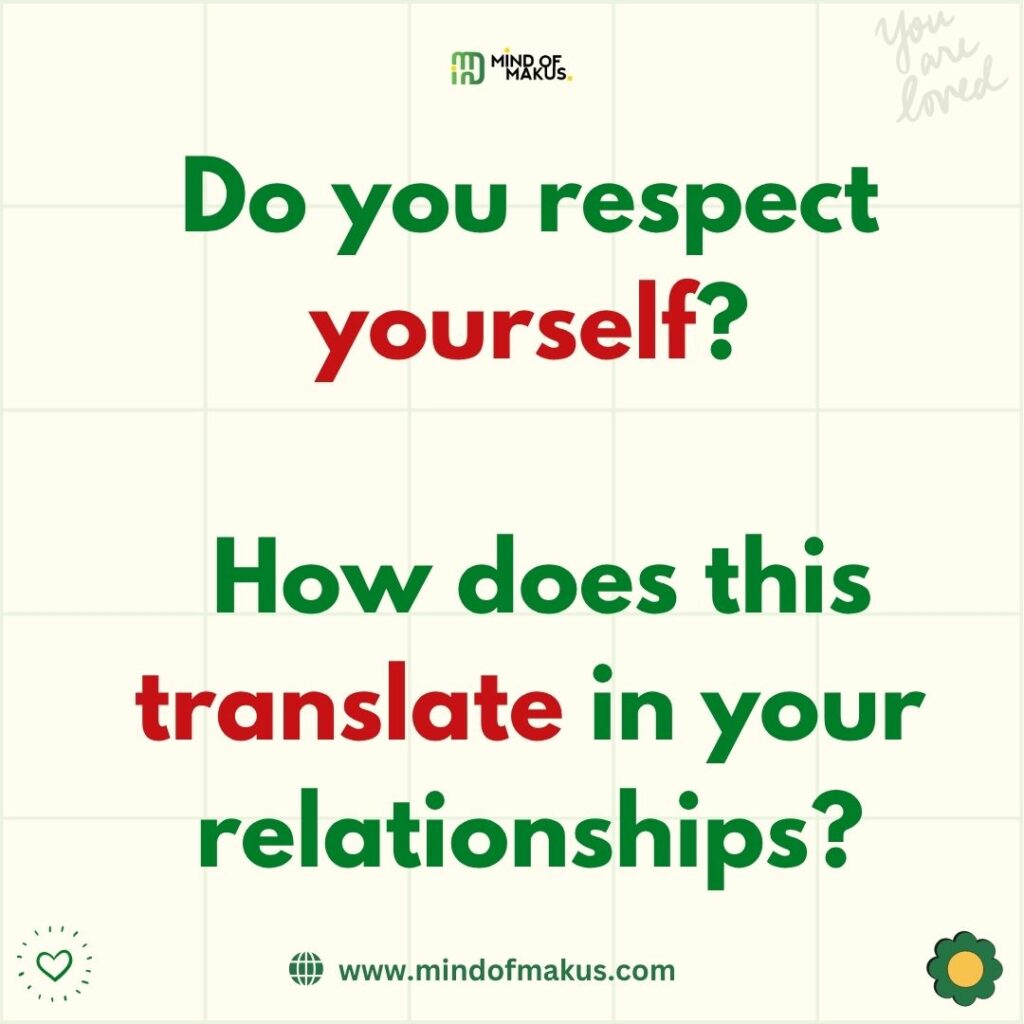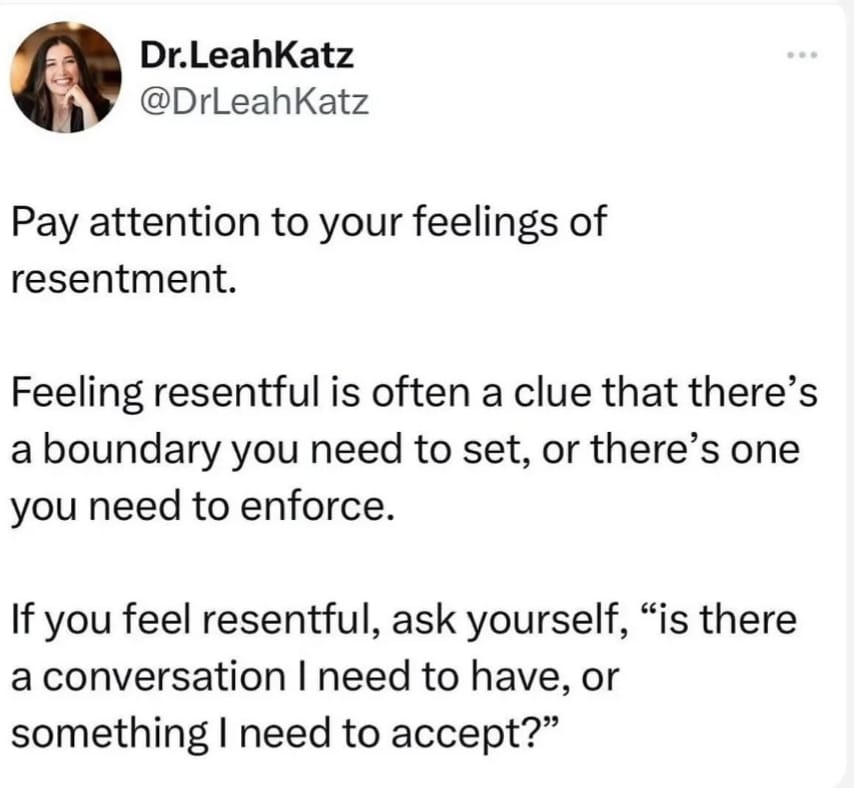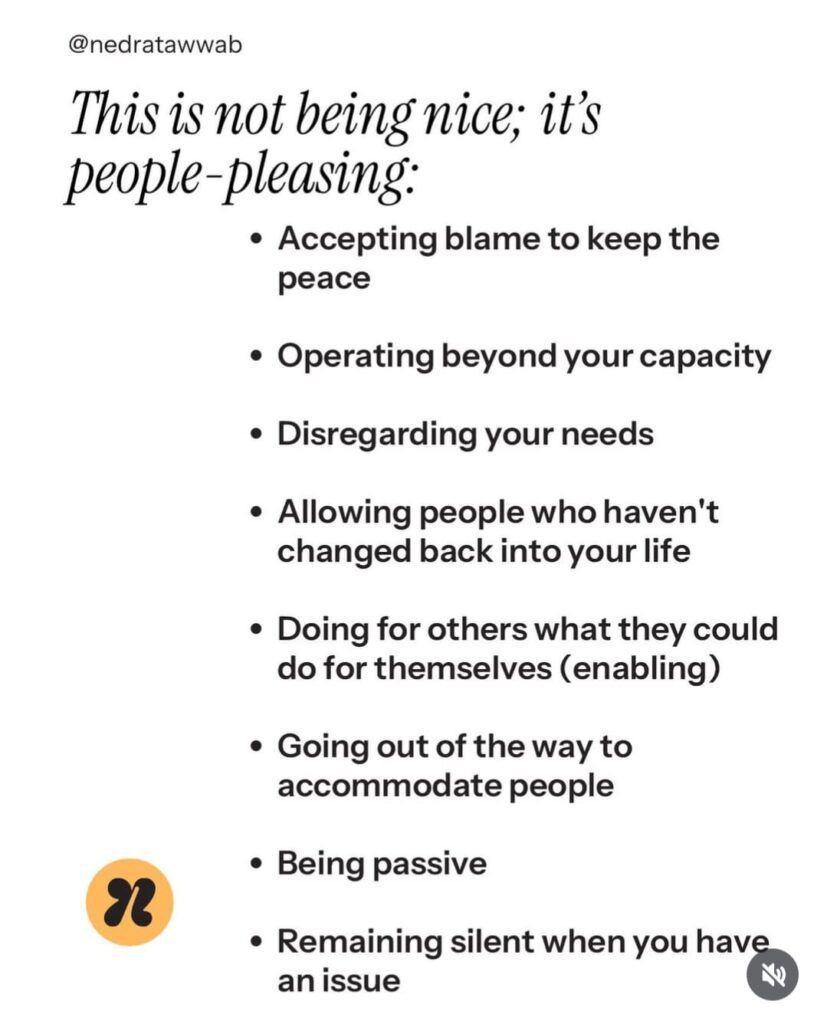Hi, my dear friends,
How are you today? Hope you had a good week? It’s deep summer here, the time of the year when ice cream is a big market. There’s an ice-cream van that thinks it’s a good idea to go around at 8 pm. I will reserve my true comments on this.
How are you managing yourself? The school closed or will soon close, and summer plans are in full gear. I am looking forward to a few breaks here and there, and more importantly, seeing friends more often.
Like you, I enjoy all the socializing and family barbeques just as much, but I find that high socializing also has an impact, people tend to feel obligated or duty-bound to agree to things and we forget to pause and consider for just a second if we really want to participate in a conversation, a party, a meeting, a project or a group chat.
Pause and think. Is this me, or is this them? So this morning, let’s talk about pleasing others as it impacts us.


Have you ever said “yes” when your mind, heart, and senses were screaming “no”?
Do you find yourself overcommitting, over-explaining, or constantly seeking approval, just to keep the peace?
Welcome to the world of people-pleasing—a behavior that may seem harmless on the surface but can silently erode your boundaries, self-worth, purpose, destiny, mental, and physical health.
In this post, we’re exploring what people-pleasing really is, where it comes from, how it affects your well-being, and most importantly, how to break free and live from a place of authenticity and self-respect.


What is People-Pleasing?
People-pleasing is the tendency to prioritize others’ needs, feelings, or expectations above your own, often at your own expense.
It might show up as:
Saying “yes” to things you don’t have the capacity for
- Avoiding conflict at all costs
- Constantly seeking validation or fearing disapproval.
- Downplaying your accomplishments so others don’t feel uncomfortable
- Feeling responsible for other people’s emotions
- Not being able to make decisions without asking 15832 people
- Never making your own plans in case XYZ wants to do FJK
While it often stems from kindness or a genuine desire to help, chronic people-pleasing is not about generosity—it’s about fear.


Where Does It Come From?
People-pleasing is often rooted in:
Childhood conditioning: If you grew up in an environment where love was conditional or conflict was dangerous, you may have learned to keep the peace at all costs.
Low self-worth: If you believe your value comes from how useful, intelligent, contributory, or agreeable you are, you may constantly seek approval. Many of you remember how taking 1st position in class brought you the endless messaging of “intelligence is your value in this family,” so you never stopped delivering on top grades.
Cultural or gender expectations: In many cultures, especially for women, being “nice,” accommodating, agreeable, having no opinion, and self-sacrificing is praised.
- Trauma or abandonment wounds: If you were neglected or abandoned, you might fear rejection so deeply that you’d rather betray yourself than lose a connection. So you love bomb the hell out of people and cry when they don’t love you as fiercely. Eyaaaaaa


The Cost of Pleasing Others
People-pleasing might win you temporary acceptance and even popularity. You become the “it guy or girl,” the one who is dependable and reliable, the one whom everyone can trust to do tasks and deliver. I love it for you, but over time, it costs you more than you realize:
1. Exhaustion and Burnout
You’re running on empty, constantly giving without receiving. You feel overwhelmed, yet you keep saying yes. You cannot imagine a situation where you can’t do it. Ah!!!! The whole thing will fall apart, the kids will starve, you say, the family will be devastated, the colleagues will crash the team, and you will lose the contract. Calm down, don’t overemphasize your importance. Life will go on.
2. Resentment
When you give too much, it’s easy to become resentful—even if you were the one who volunteered. You see that shouting you do every day, it is partly resentment that you are the only one who sees the stuff you keep shouting about. * Grab a cold drink*. The frown you have in meetings is partly resentment of the team member who is speaking, because they never deliver, and they take credit for your background work. The conversations you are not having are slowly killing you. Start saying no and setting more boundaries openly.


3. Loss of Identity
You’re so busy meeting others’ needs that you forget what you want, need, or value.
One day, a few years ago, I looked at myself and realized that I resembled nothing of who I thought I was. I was lost. I started by making a plan, creating time, writing loads of reflections, and deliberately filling up my hours with things that felt original to me, not anyone else.
Not seeking or taking permission. Just doing it. You may say that’s selfish, but that’s why you are here reading, and I am the one writing. I have lived through it qnd thrived. The person you become when you find your own path, benefits everyone. it is not selfish to be assertive, to rest, to define your values and live according to them. It is how we do our best work in the world God put us in.
Start today and let everyone else start adjusting to who you really are as God made you. Full of gifts and talents and boldness to express them.
Subscribe to My Newsletter
4. Inauthentic Relationships
If people only love the version of you that’s agreeable, helpful, or compliant, they don’t really know you. Hay! You see, eh! This one is a big one. You morph so much that, apart from you not recognizing yourself, people struggle with who you are becoming when you start to change, because all this time they have been in a fake relationship with the version of you that suited their own needs and weaknesses.
Imagine my husband not knowing that pounded yam is my vibe because I have been eating spaghetti with him all this time just to please him. Stop it.
It applies to relationships and everything that we do in relation to others, i.e food, clothes, fun, hobbies, parenting, work. Make it real, because real lasts longer.
5. Anxiety and Guilt
Saying no or setting boundaries feels like a personal failure or betrayal, triggering waves of guilt. The deep feeling of guilt you feel after a no, and the guts some people have to rub it in by sending you long texts and voice notes to guilt-trip you. Delete them, don’t listen. Walk away, end the conversation. No, is a full sentence. If you don’t want to explain, don’t.
Now how do you manage the guilt, find a hobby you like to do, and get into it, occupy that time you used to worry and think with something meaningful. Simple, but it works. If you start working on it today, you will get better at it. Practice with your children and then your partner, and one day you will do it in a national scale. No is No.


Freedom from People-Pleasing
Breaking the habit isn’t easy—but it’s worth it. Here’s how to start:
1. Practice Pausing Before You Say “Yes”
Train yourself to say, “Let me get back to you” instead of automatically agreeing. This gives you time to assess if it’s a true yes or a pressured one.
2. Get Comfortable with Discomfort
You will disappoint someone eventually—and that’s okay. Boundaries don’t make you mean; they make you honest. Accept that in this world, not all people will love you; you only need a few.
3. Challenge the Guilt
Guilt isn’t always a sign you’ve done something wrong. Sometimes, it’s just a sign you’re doing something new. Let guilt rise and pass—it’s not your compass. Read Brene Brown’s book, “ Atlas of the Heart”.


4. Reclaim Your Voice
You’re allowed to have needs, opinions, and preferences. Start small: speak up about what restaurant you prefer, or what day works best for you. If you struggle to speak, type, write, or use voice notes. If you don’t know, do research; it’s a good opportunity to explore. Just don’t do anything, you are not a rock, do something, please.
5. Build Self-Compassion
Your worth is not tied to your usefulness. Practice affirmations like:
“I am enough even when I say no.”
“It is safe to take care of myself.”
“I can’t pour from an empty cup.”
6. Seek Safe Relationships
Surround yourself with people who respect your boundaries. Safe people don’t punish you for protecting your peace. The day I saw a full-grown adult throw a tantrum because of a “no,” I realized that actually, to witness it was disrespectful. To even engage in a discussion concerning what triggered the tantrum was even more so. When you notice such situations, removing yourself is a sign of self-respect. Unsafe relationships are a sign to exit.
You can Support My Work
Final Thoughts: Choose You
You weren’t created to live a life of silent sacrifice. When you want to make a sacrifice, it should be out of love, not out of fear of retribution. Jesus is the example of what a pure, heartfelt sacrifice of love is.
You don’t have to be everything for everyone.
You don’t need to earn your worth.
You don’t have to explain your no.
It’s okay to be kind, but not at the cost of your well-being.
So today, choose you. Even if your voice shakes. Even if they don’t understand. Even if it’s uncomfortable.
Because you matter, and your healing begins the moment you decide to stop betraying yourself for acceptance.
Every time you turn on your people-pleasing, you betray yourself.
Call to Action:
Have you ever struggled with people-pleasing? What helps you reclaim your peace? Share your experience in the comments or send this to someone who needs to hear this today.
Until next time, stay authentic.
Stay resilient, and continue to honour your needs.
Live wholeheartedly,
Amaka

